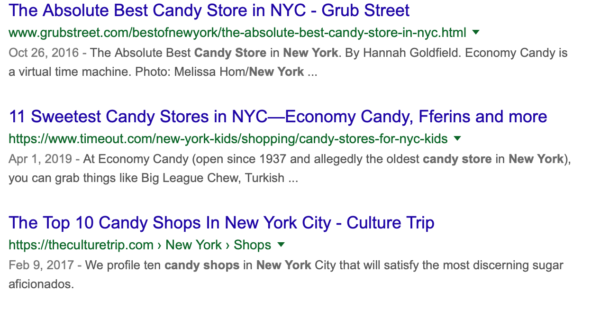SEOs like keywords. These are the words people search for. The words that make your posts and pages rank. You put a lot of effort into finding that perfect keyword to optimize your article for. So, why shouldn’t you use that exact keyword over and over again? Why should you use synonyms and related keywords? Will doing that help improve your rankings? Well: Yes! As a matter of fact: using synonyms and related keywords the right way will most definitely help you rank. In this post, I’ll explain why.
A good writer mixes things up!
The most important reason why you should use synonyms and related keywords is because it will make your text so much nicer to read. If you write a text about ‘candy’ and you use the word ‘candy’ in every other sentence, your text will get boring. Your readers will stop reading and click away. You’ll lose your audience. That’s why you should mix things up. Words like ‘sweets’ and ‘delicacy’ could serve as synonyms for ‘candy’. Related keywords would be ‘chocolate’ and ‘sugar,’ which aren’t real synonyms for ‘candy’, but still relevant.
For a text to be attractive to a reader, it should be very varied. You can vary with a lot of things. For instance, you can try to alternate long sentences with shorter ones. That makes a text much more attractive. You can also try to alternate the sequence of words. But the most important tool is to vary with the exact words you use. Especially if you’re trying to rank for a long tail keyphrase such as ‘candy store New York’. Using that exact key phrase in a lot of sentences will make it awful to read. Using synonyms and related keywords, on the other hand, makes a text much more attractive.
But wait: what about keyword density?
Of course, it is important to use your focus keyword regularly, but you should not overdo it. In the old days, SEOs tended to stuff their texts with a lot of keywords. That way, Google would understand what the text was about and rank it accordingly. But Google is not that stupid anymore. It can read and understand texts.
If you search for ‘candy store New York’ you’ll get results from Google with content from ‘candy stores’ as well as ‘candy shops’. Google understands that ‘store’ and ‘shop’ are synonyms, and treats them as such.

It is important to use your focus keyword a few times throughout your post. The focus keyword is the word or phrase your audience is searching for. That exact match remains important. These are the words your audience uses, the words your audience expects to find. But, instead of using your focus keyword over and over again, you should mix things up with synonyms and related keywords.
How often should you use synonyms?
The usage of synonyms versus the use of the focus keywords is no exact science. The most important criterion is the reader. So, read and re-read your text. Is it text nice and easy to read? Or are you getting annoyed by the constant use of a certain term? Let other people read your text. Ask them for feedback.
If you need more guidance, Yoast SEO will help you to use synonyms and related keywords as well. In Yoast SEO Premium, you can add synonyms of your focus keyword. The plugin can check if you’ve used those synonyms in, for instance, your meta description, introduction, subheadings or image alt text. Moreover, our keyphrase distribution check (added in Yoast SEO 7.8) will reward you for alternately using your keyphrase and its synonyms throughout your text.
One step further: use those synonyms to your advantage
Google understands texts and takes related concepts and synonyms into account. In the old days, Google wasn’t that smart. But nowadays, it wants to serve its users the best result. It is able to recognize related entities. In the end, Google just wants to serve readable texts.
So make sure you deliver! Think of synonyms for your keyword or keyphrase and use them to your advantage. Take a moment and try to come up with a few alternatives for your keyword. Think of things that are strongly related to your keyword. Enter these words in our SEO analysis and make sure to use those in your text. You’ll increase your chances to rank, and more importantly: your content will be more pleasant to read if you use synonyms and related keywords!
Conclusion
Keywords remain essential. These are the words your audience is searching for. People searching for ‘candy’ will probably not click on a result with ‘delicacy’ in the text. If you search for ‘candy’ you’ll expect to see that exact word in the search results. Therefore, exact match keywords remain the most important keywords.
That being said, synonyms and related concepts are very important as well. You just need those to write a readable text. You can’t repeat yourself over and over, especially if you’re optimizing your text for a long tail keyword. Furthermore, using synonyms and related keywords may create ranking opportunities you’d otherwise have missed. In Yoast SEO premium, we offer all the features you need to take into account word forms, synonyms and related keywords.
